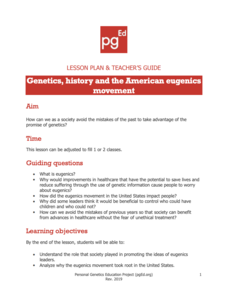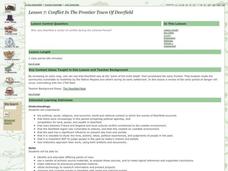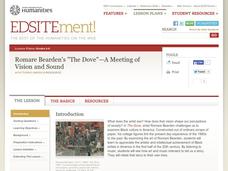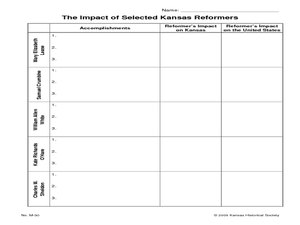Stanford University
Soviets in Berlin
High school historians use their knowledge of WWII to analyze a photo of the Soviets entering Berlin. The social studies assessment is comprised of two short answer questions to assess academics' understanding of the historical...
Syracuse University
Harlem Renaissance
The music and literature of the Harlem Renaissance defined American culture, including its poetry. Using a poem from the period, individuals explore its musical qualities and how it is reflective of the period. Then, they use what they...
Stanford University
Annexation of Hawaii
Once an independent nation, Hawaii became part of the United States only after a business-sponsored coup of its queen. After examining newspapers from the 1890s, learners consider whether native Hawaiians wished to become Americans at...
Personal Genetics Education Project
Genetics, history and the American Eugenics Movement
A poignant 20-slide show introduces high schoolers to the amazing accomplishments of genomics and raises the question of eugenics. This lesson is only for mature audiences, as it deals with rape and other sensitive topics, but it is...
National Endowment for the Humanities
The House Un-American Activities Committee
Was the House Un-American Activities Committee justified in investigating subversive influences in the entertainment industry? Part two of the three-part series of lessons that examine the anti-communism movement after World War II,...
Curated OER
Games Children Play: Then and Now
Second graders examine primary documents to discover similarities and differences in life today and life before. In this toys then and now lesson, 2nd graders complete a graphic organizer to show how things have changed or stayed...
Curated OER
Letter Writing and Abigail Adams
Third graders learn the importance of letter writing for communication. In this letter writing lesson, 3rd graders identify how letter writing was important in the life of Abigail Adams. Students understand what a primary source is and...
Curated OER
Reforms of the Mid-1800's
Seventh graders complete a unit of lessons on the reform movements of the mid-1800's in the U.S. They participate in an Internet scavenger hunt, analyze primary source documents, and develop and perform a simulation of a mid-19th century...
Curated OER
Old Hickories
Students analyze historical events to develop a historical perspective. In this critical analysis lesson, students read excerpts, primary sources and other materials in order to understand the Native American Removal that occurred during...
Curated OER
In His Own Words: James Madison On the Problem of Faction
Students are introduced to the writings of James Madison and explain why he is often called "The Father of the Constitution". Using primary source documents, they examine his view of the Bill of Rights and what he meant by faction. In...
Curated OER
Conflict in the Frontier town of Deerfield
Young scholars use primary sources to investigate, explore and represent varying perspectives on the 1704 Deerfield Raid. They consider the reasons Deerfield was at the center of English, French and Native American conflicts in the early...
Curated OER
Treaty Trail: Historical Perspectives Point of View
Students research the point of view of key figures present at the Walla Walla Treaty council. Students analyze primary and secondary sources to determine how various groups of people involved in the treaty council viewed the events as...
Curated OER
Life on the Trails
Fourth graders explore U.S. Geography by completing a worksheet. In this west coast geography lesson plan, 4th graders discuss the Santa Fe and Oregon-California trails and the people who traveled them in the 1800's. Students define...
Curated OER
Romare Bearden's The Dove - A Meeting of Vision and Sound
Students explore African american culture of the late 1950's and 60's through various primary sources including literature, music, art and others. They then prepare and conduct a mock interview and present with the class.
Curated OER
What's in a Name? The Use of Native American Images in Sports
Students discuss and analyze the pros and cons of using Native American names and images to represent sports teams. Using primary sources, including position statements from Native American tribes, interviews with school alumni and...
Curated OER
Forward, Into the Past!
Young scholars, during a (virtual) visit to a burial ground, think about the past by viewing tombstones as primary sources. They explain how the attitudes of Deerfield residents toward death and burial evolved from 1780-1880.
Curated OER
My Very Own Washington Exhibition
Students work as curators. In this George Washington lesson, students research primary and secondary sources in order to create their own exhibitions of the first president. Students may visit selected Web sites in order to create their...
Curated OER
Spear Point Production
Students explore that prehistoric people had to have a good knowledge of the physical world around them in order to choose the best material for spear production. They also explore that prehistoric people were intelligent beings who...
Curated OER
A History of Journal Writing
Students articulate their prior knowledge concerning the purposes of journal writing. They explore what function journal writing has fulfilled for various cultures and peoples. Students read and analyze various journal entries by famous...
Curated OER
Geographic Luck
Students examine why some countries are rich while others remain poor. They view a video on the website, Guns, Germs and Steel, analyze primary sources to conduct research about plants and animals, and create a game based on their research.
Curated OER
Social Sstudies: Change in Space and Time
Learners examine the dynamics of change and compare and contrast it with other cultures. They cite examples of how people change over time and explain why it is necessary. Students organize a skit, Webpage, or Powerpoint presentation...
Facing History and Ourselves
We and They, the Armenians in the Ottoman Empire
Learners examine World War I war crimes. For this world history instructional activity, students use primary and secondary sources to research and understand the action taken by the United States during the Armenian Genocide. Learners...
Curated OER
Drake’s West Indian Voyage 1588-1589
Students examine the exploration routes of Sir Francis Drake. In this American exploration instructional activity, students investigate primary sources to trace the routes and contact with the natives that Sir Francis Drake experienced...
Curated OER
Meet the Reformers
Seventh graders interpret historical evidence presented in primary and secondary resources. In this American reformers lesson, 7th graders research the accomplishments of selected reformers. Students then use the information they uncover...

























